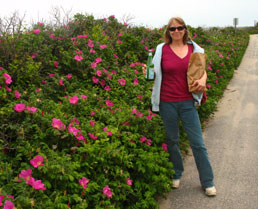
![[photo of fish]](images/kleinholz_fish_07.gif)
 |
 |
 |
 |
 |
 |
 |
 |
 |
I was brought up in Port Washington, Long Island. My father was an artist, painter Frank Kleinholz, and my mother, Lidia, taught school. We lived half a block from the bay.
Theater and ceramics In my early childhood I fell in love with theater. I read hundreds of plays and had roles in community productions and summer stock. Acting taught me about dialogue, conflict, and scene structure. I went to Northwestern University with the intention of majoring in theater, but I soon realized that I enjoyed preparing the role more than being on stage, and I began to write. Once I decided to become a novelist, it took me a long time to find my voice and develop my craft. In the meantime I learned ceramics at Earthworks & Artisans, a studio pottery on West 85th Street in Manhattan. I became a professional potter and ran the studio for several years. Working in clay turned out to be wonderful training for writing. If I were to teach aspiring writers, I'd first show them how to throw pots. Among the lessons I learned:
Why I chose to write about Zoë Szabo, and why I gave the series a rock 'n' roll "edge" I wanted to create a female sleuth who reflected the demands that juggling children and career places on working mothers. Murderer or not, diapers have to be changed, kids have to be picked up from school, and dinner has to be on the table at six o'clock. Even if you have a fully involved partner, as I do, managing job and family is a challenge. I immersed Zoë in rock 'n' roll, because I love music, and it gave me a great excuse to round out my collection and reread back issues of Rolling Stone and Spin. Not to mention being able to stretch out with my eyes closed and the headphones on and tell my kids that whatever they wanted would have to wait because "Mom is working." How I published my mystery I wrote Exiles on Main Street with the help of two fellowships at the Virginia Center for the Creative Arts. After I finished the book, I spent two years peddling it to agents and nearly gave up. I attribute the sale to my younger daughter, who kept pestering me for a dog. Finally, in a moment of exasperation, I told her she could have one if I sold a novel. After dozens of rejections this seemed a safe bet. Almost as soon as the words were out of my mouth, an agent called asking to read the book. After a revision, she sold it within a few weeks. We now have a published book and Milo, a cute, bouncy bichon frise. At this point I feel that anyone who has successfully housetrained a puppy should find writing a mystery a breeze.
Photo of Lisa in Nantucket © Siena Kaplan |
 The two things I miss the most from my childhood are the scent of oil paints and the colors of the sea, which changed with the time of day, the season, and the weather. My early years were spent in France, and I learned French along with English. My family returned to the United States when I was four. In America I spoke French more easily than English and was mystified when children didn't understand what I was saying. When I first interviewed Cambodian refugees for an article in the Amherst Bulletin, I immediately connected. Every problem they face—and there are many as a result of the trauma of the killing fields—is compounded by language difficulties.
The two things I miss the most from my childhood are the scent of oil paints and the colors of the sea, which changed with the time of day, the season, and the weather. My early years were spent in France, and I learned French along with English. My family returned to the United States when I was four. In America I spoke French more easily than English and was mystified when children didn't understand what I was saying. When I first interviewed Cambodian refugees for an article in the Amherst Bulletin, I immediately connected. Every problem they face—and there are many as a result of the trauma of the killing fields—is compounded by language difficulties.